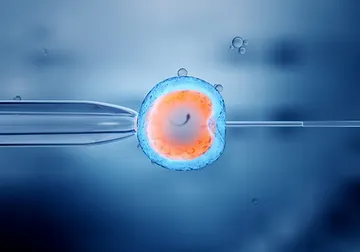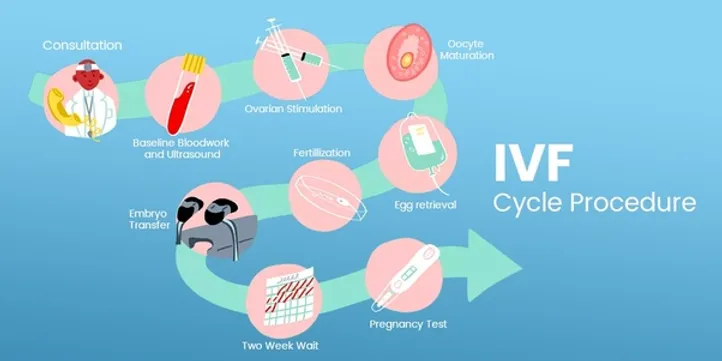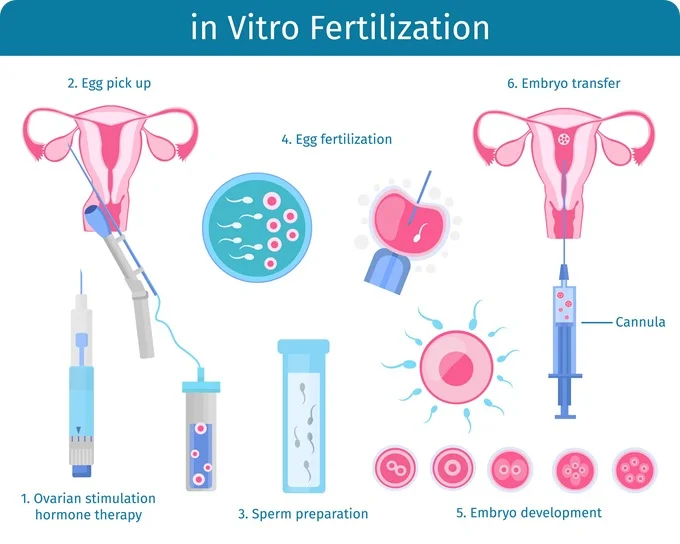
What is IVF?
IVF stands for In Vitro Fertilization. In vitro fertilization is a procedure of fertilization where an adult egg is combined with viable sperm outside of the body, in-vitro. The procedure involves stimulating and monitoring the male partner's fertility cycle, removing an existing ovum from their bodies and allowing mature sperm in a lab to fertilize them. Once this process has taken place, the embryo is placed into the woman's uterus, where it will remain until the full term delivery of the baby.
The ovaries are removed during what is in so that there is no chance of fertilizing the eggs. The sperm is then allowed to mature for one to two days before being transferred into the uterus. After a few days, the embryo implants itself into the uterus, where it will stay until the full term delivery of the child. There is a higher risk when performing what it is. It involves harvesting more eggs than a traditional IVF, and it also involves harvesting more sperm than a traditional IVF
How COVID Effects IVF?
It is not clear how the effect would come about. There is some evidence that the Corona virus could work by tricking the ovary into believing that the egg is already fertilized when it is not. But some research suggests that there is only a very slight chance that this process will work.
So the question remains as to how this effect came about in the first place. Some scientists think that it was caused by one or more of the abnormalities of DNA known to occur in the human reproductive system. These include cysts and mosaics. Other researchers think that the effect could be caused by a coronavirus that affects how the chromosomes travel around the cell. Some examples of these include deletion and insertion disorders.
A lot of different things can disrupt the DNA's instructions to the chromosomes. One of them is radiation. It has been shown that exposure to high levels of radiation can lead to cellular damage. This, in turn, can lead to miscarriages, ovarian cysts, and even the mutation of the egg itself. Other potential sources of the Coronas effect include infections, diseases, and medications.
The research that has been done on how this effect comes about is still being conducted. As of right now, however, there is no way to confirm exactly what is happening.

How Can You Deal with the Effect of Corona on IVF?
If you are currently undergoing infertility treatment, do not worry. There are ways to reverse the effect, but it will take a bit of time. You may have to undergo more treatments, but you will conceive naturally in the long run. Just remain patient.
If your doctor has discovered that you may have a Corona effect on your fertility, he may recommend that you start taking anti-bacterial medicine. This can help reverse the effect on the egg. However, anti-bacterial medicine does not stop the effect on the egg, so it may not be helpful if you are losing your fertility because of this effect.
The treatment procedure involves destroying abnormal cells with chemicals such as methotrexate or gemcitabine. The healthy cells are destroyed in a separate process. This destroys only the abnormal cells in the uterus wall and the supporting pelvic organs. The uterus and ovaries may heal, but scar tissue develops. However, if the patient does not conceive within a year of treatment, the procedure is repeated.
Once your fertility has been affected by this virus, it may be hard for your body to get rid of it. This means that there may be some effects on IVF. Your treatment may require that you take certain drugs. These drugs will help the body rid itself of the virus, but they may also be responsible for further decreases infertility after your treatment is finished.
If you are experiencing one or more of the effects of IVF, your doctor may recommend that you wait to conceive while treating the virus. This will keep your health at risk and may cause a miscarriage. In rare cases, women have gone into labour after being treated for this virus effect on IVF.

Is IVF safe in COVID
Most women want to know if IVF is safe in coronavirus. The question is often asked because the virus is responsible for forming abnormal tissue in the uterus, ovaries and fallopian tubes in women. This can lead to infertility or a miscarriage.
Sometimes, the ovaries are affected because of the coronavirus but usually do not die as they would in the uterus. However, the eggs released by the ovaries cannot fertilize.
IVF is safe in covid because the procedure utilizes the same method to destroy abnormal cells in the uterus and ovaries. Therefore, there is no disruption of the reproductive system. Additionally, the fallopian tubes are not damaged during the treatment. The treatment merely breaks up the abnormal cells and allows the healthy follicles to resume normal function. It is safe in this way because no damage occurs to the uterus or ovaries.
Is IVF safe in coronavirus? The answer is yes. The treatment is performed very safely in covid times also, and the patient can have children. IVF is performed with many success rates and rarely has any problems in this pandemic. The success rate is approximately 95%.
Conclusion
Once the Corona Virus reaches its destination, it will begin to reproduce itself. This can be harmful to the pregnant woman, as her body will have no way of fighting it off. Once the viral reproduction process starts, it will produce symptoms similar to those of an STD. These include vaginal itching and irritation and fatigue, nausea, headaches, fever, and general soreness of the body.
Once these symptoms appear, you should consult your OB/GYN or Obstetrician as soon as possible. This will allow them to perform any necessary tests to determine whether or not you are infected with the Corona Virus during your pregnancy. If you are, your doctor will likely want to perform a blood test to see if antibodies have been produced. This will determine if you are infected with the Corona Virus and how much it was transmitted to your child.
